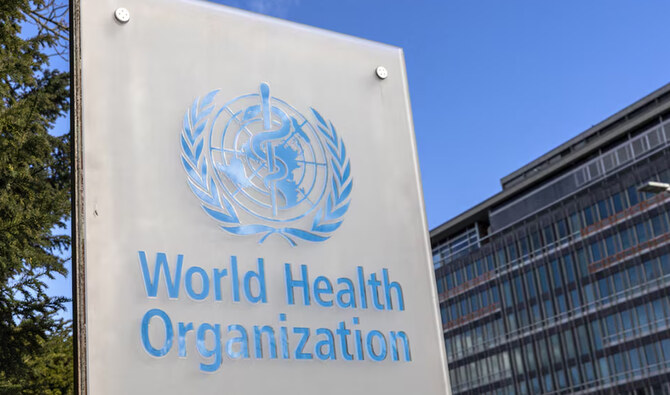LONDON: The World Health Organization and partners on Friday set up a scheme to help bring mpox vaccines, tests and treatments to the most vulnerable people in the world’s poorest countries, similar to efforts during the COVID-19 pandemic, after earlier approving the first shot for the fast-spreading disease.
Both steps should make it easier for badly-hit African countries to access the vaccine, as a new type of the mpox virus spreads from the Democratic Republic of Congo to its neighbors. The WHO has declared the outbreak a global public health emergency.
“Alongside other public health interventions, vaccines, therapeutics and diagnostics are powerful tools for bringing the mpox outbreaks in Africa under control,” said WHO Director-General Tedros Adhanom Ghebreyesus.
He said COVID-19 had shown the need for international collaboration to make access fairer. During the pandemic, many low-income countries were left behind in the global scramble for medical resources, particularly vaccines.
European countries, the United States and Japan have already pledged to donate 3.6 million doses of the two main vaccines used against mpox, the WHO said on Friday. Vaccinations are due to start from Oct. 2 with the first tranches of donations.
The WHO urged more countries to donate shots that were originally developed and stockpiled by rich nations for smallpox, and said it would work with affected countries to get them to the people at highest risk.
Earlier on Friday, the WHO said it had approved Bavarian Nordic’s vaccine, known as Jynneos in the United States. It is also considering LC16, made by the Japanese manufacturer KM Biologics.
The approval, known as prequalification, means UN agencies can now buy the vaccines as well as help co-ordinate donations. Gavi, the Vaccine Alliance, co-funds vaccine purchases for low-income countries in this way and has up to $500 million to spend on mpox.
DELAYS
The WHO has faced criticism for moving too slowly on mpox vaccines.
Bavarian Nordic’s vaccine has been used worldwide since 2022, after US and European regulators backed it for use against a different strain of mpox that spread globally in 2022.
The WHO only formally began the process in August this year. Other factors, including the roughly $100 price tag for the vaccine, competing disease outbreaks, and sluggish processes in badly-hit countries like Congo have also played a role.
“The evidence we have now is... it is important we take advantage of it (the vaccine) to protect our population,” Dimie Ogoina, chair of the WHO’s mpox emergency committee, had said before the approval.
He however stressed that vaccines were not a “magic bullet” and other public health measures were also important.
‘OFF-LABEL’ USE IN CHILDREN
Bavarian Nordic said the vaccine was cleared for immunization against smallpox, mpox, and related orthopoxvirus in those who are 18 and older, but it could be used “off-label” for children and pregnant and immunocompromised people in outbreak conditions, where the benefits of vaccination outweigh the risks. LC16 can already be given to children, according to the Japanese regulator, although it requires a special kind of needle.
Children are particularly vulnerable to mpox, a viral infection that typically causes flu-like symptoms and pus-filled skin lesions, as well as people with immune system conditions, such as HIV.
WHO clears Bavarian Nordic’s vaccine for mpox, sets up access scheme
https://arab.news/9xadx
WHO clears Bavarian Nordic’s vaccine for mpox, sets up access scheme

- WHO has faced criticism for moving too slowly on mpox vaccines
- Bavarian Nordic’s vaccine has been used worldwide since 2022
Blair dropped from Gaza ‘peace board’ after Arab objections

- Former UK PM was viewed with hostility over role in Iraq War
- He reportedly met Netanyahu late last month to discuss plans
LONDON: Former UK Prime Minister Tony Blair has been withdrawn from the US-led Gaza “peace council” following objections by Arab and Muslim countries, The Guardian reported.
US President Donald Trump has said he would chair the council. Blair was long floated for a prominent role in the administration, but has now been quietly dropped, according to the Financial Times.
Blair had been lobbying for a position in the postwar council and oversaw a plan for Gaza from his Tony Blair Institute for Global Change that involved Jared Kushner, Trump’s son-in-law.
Supporters of the former British leader cited his role in the Good Friday Agreement, which ended decades of conflict and violence in Northern Ireland.
His detractors, however, highlighted his former position as representative of the Middle East Quartet, made up of the UN, EU, Russia and US, which aimed to bring about peace in the Middle East.
Furthermore, Blair’s involvement in the Iraq War is viewed with hostility across the Arab world.
After Trump revealed his 20-point plan to end the Israel-Hamas war in September, Blair was the only figure publicly named as taking a potential role in the postwar peace council.
The US president supported his appointment and labeled him a “very good man.”
A source told the Financial Times that Blair’s involvement was backed by the US and Israel.
“The Americans like him and the Israelis like him,” the person said.
The US plan for Gaza was criticized in some quarters for proposing a separate Gaza framework that did not include the West Bank, stoking fears that the occupied Palestinian territories would become separate polities indefinitely.
Trump said in October: “I’ve always liked Tony, but I want to find out that he’s an acceptable choice to everybody.”
Blair is reported to have held an unpublicized meeting with Israeli Prime Minister Benjamin Netanyahu late last month to discuss plans.
His office declined to comment to The Guardian, but an ally said the former prime minister would not be sitting on Gaza’s “board of peace.”












